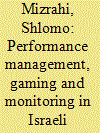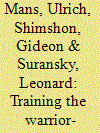| Srl | Item |
| 1 |
ID:
100774


|
|
|
|
|
| Publication |
New York, John Wiley and Sons, Inc., 1972.
|
| Description |
viii, 184p.Hbk
|
| Standard Number |
0471134856
|
|
|
|
|
|
|
|
|
|
|
|
Copies: C:1/I:0,R:0,Q:0
Circulation
| Accession# | Call# | Current Location | Status | Policy | Location |
| 010508 | 658.4033/CAR 010508 | Main | On Shelf | General | |
|
|
|
|
| 2 |
ID:
167149


|
|
|
|
|
| Summary/Abstract |
Recent comparative measures rank Israel very high on the innovation scale and note its preference for informal managerial practices. Based on a principal–agent analysis, this article explains that the economic and administrative systems in Israel have created the basis for the evolution of a managerial culture characterised by constant distortions and the gaming of performance information, lack of truthful reporting and improvisation. On the positive side, this managerial culture encourages innovation; on the negative side, it creates significant problems related to accountability, ethical conduct and overall managerial quality.
|
|
|
|
|
|
|
|
|
|
|
|
|
|
|
|
| 3 |
ID:
142567


|
|
|
|
|
| Summary/Abstract |
The implementation of China's reform era target-based cadre evaluation system has instigated various types of gaming behaviour on the part of local officials. How do these gaming strategies differ from each other? Why do local officials sacrifice the public interest for target fulfilment in some cases but not in others? This article argues that gaming is not monolithic and should not be treated as such. It develops a typology that distinguishes between pernicious and benign gaming, and looks into the symptoms and motives of pernicious gaming in particular. It finds that the distinct design of the measurement system – the combination of result-oriented targets imposed from above and high-powered incentives for target fulfilment – induces pernicious gaming. In addition, the system's implementation practically compels local officials to misrepresent their performance, even though they are aware of the negative impact of such behaviour on the public interest. This study shows that to understand the strategies, motivations and implications of gaming better, a more nuanced approach is needed.
|
|
|
|
|
|
|
|
|
|
|
|
|
|
|
|
| 4 |
ID:
098446


|
|
|
|
|
| Publication |
2010.
|
| Summary/Abstract |
Despite the wealth of experience among simulation scholars, there is still little consensus on how to link gaming attributes to specific learning objectives. This article aims to contribute to this discussion and argues that specific simulation design can lead to reaching pre-defined learning objectives. The authors present a teaching project developed and executed for the Netherlands Defense Academy, how it was set up in 2005, and the way it evolved over time. The authors discuss how the methodology fits into the academic debate on the strengths of experiential learning. The simulation methodology used is rooted in experiential learning and typically supports standard learning goals and styles. When dealing with a specific target group, it is possible to pinpoint one specific, overarching learning objective. This allows trainers to link each individual aspect of the simulation design to that particular learning goal and, in turn, provides a valuable framework to develop, run and evaluate simulation exercises. The authors discuss how two innovative elements in simulating gaming can help to make such an approach work: combining closed and open scenarios, and new communication software that allows for continuous supervision during the game. The conclusions discuss how students respond to the challenges during the game and what the data from debriefings tells us about the methodology's learning appeal for a military target group.
|
|
|
|
|
|
|
|
|
|
|
|
|
|
|
|